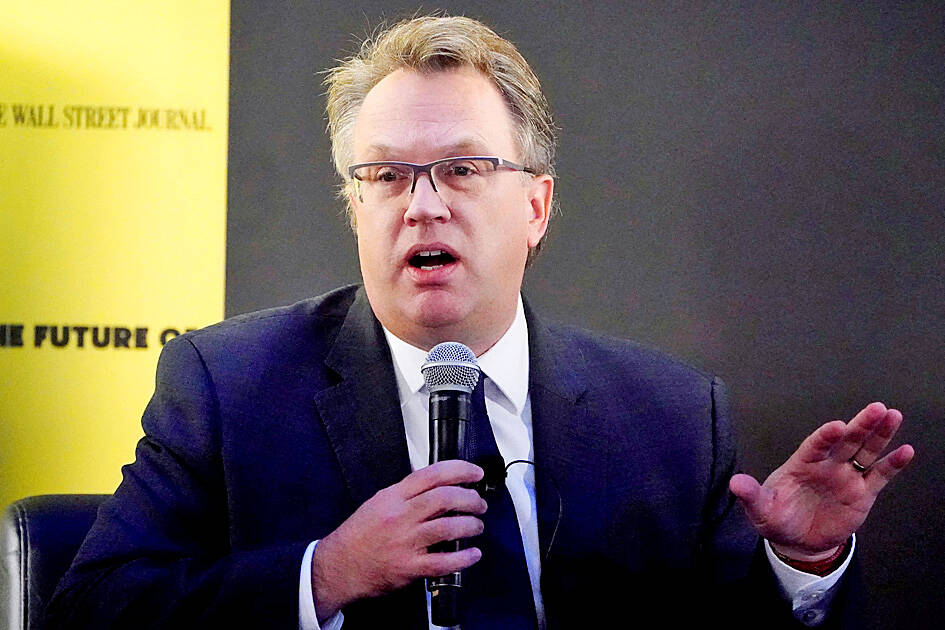While there are some signs that global and domestic inflation pressures are easing, high prices have spread, making it harder to quell quickly, a top US central banker said on Monday.
Continued strong demand for goods and for workers would keep pressure on inflation — which has hit the highest in 40 years — New York Federal Reserve President John Williams said.
“This is resulting in broad-based inflation, which will take longer to bring down,” Williams said.

Photo: Reuters
Prices soared over the past year in part due to worldwide supply chain snags, creating shortages of key components such as computer chips for vehicles and electronics.
Those issues have been exacerbated by the Russian invasion of Ukraine, which sent food and energy prices surging, and “zero COVID-19” policies in China.
Those supply constraints are easing, while rising interest rates are cooling demand, helping to bring down prices of many commodities such as lumber, which should lower inflation, Williams said in a speech to the US Hispanic Chamber of Commerce National Conference in Phoenix, Arizona.
“Unfortunately, that’s it for the good news on inflation,” he said, warning that those factors “will not be enough by themselves to bring inflation back to our 2 percent objective.”
The US Fed has moved aggressively this year to tamp down demand to help drive prices lower, hiking interest rates five times, for a total of 3 percentage points.
The US central bank has said more increases are coming this year.
“From Main Street to Wall Street ... inflation is the No. 1 concern,” Williams said, adding: “Our job is not yet done.”
Even as supply issues improve, “demand for durable goods remains very high — beyond what can be produced and brought to market,” while “demand for labor and services is far outstripping available supply,” he said.
Still, Williams said he expects the aggressive US Fed moves, along with similar steps by other major central banks, will help to restore balance globally.
“The combination of cooling global demand and steady improvements in supply ... should contribute to inflation declining to about 3 percent next year,” he said.
The US Fed’s preferred index showed that annual inflation slowed to 6.2 percent in August from a peak of 7.0 percent in June.
Williams said he expects US economic growth to be close to flat this year and post modest growth next year, with a slight uptick in unemployment.

Taiwan Semiconductor Manufacturing Co (TSMC, 台積電) last week recorded an increase in the number of shareholders to the highest in almost eight months, despite its share price falling 3.38 percent from the previous week, Taiwan Stock Exchange data released on Saturday showed. As of Friday, TSMC had 1.88 million shareholders, the most since the week of April 25 and an increase of 31,870 from the previous week, the data showed. The number of shareholders jumped despite a drop of NT$50 (US$1.59), or 3.38 percent, in TSMC’s share price from a week earlier to NT$1,430, as investors took profits from their earlier gains

In a high-security Shenzhen laboratory, Chinese scientists have built what Washington has spent years trying to prevent: a prototype of a machine capable of producing the cutting-edge semiconductor chips that power artificial intelligence (AI), smartphones and weapons central to Western military dominance, Reuters has learned. Completed early this year and undergoing testing, the prototype fills nearly an entire factory floor. It was built by a team of former engineers from Dutch semiconductor giant ASML who reverse-engineered the company’s extreme ultraviolet lithography (EUV) machines, according to two people with knowledge of the project. EUV machines sit at the heart of a technological Cold

AI TALENT: No financial details were released about the deal, in which top Groq executives, including its CEO, would join Nvidia to help advance the technology Nvidia Corp has agreed to a licensing deal with artificial intelligence (AI) start-up Groq, furthering its investments in companies connected to the AI boom and gaining the right to add a new type of technology to its products. The world’s largest publicly traded company has paid for the right to use Groq’s technology and is to integrate its chip design into future products. Some of the start-up’s executives are leaving to join Nvidia to help with that effort, the companies said. Groq would continue as an independent company with a new chief executive, it said on Wednesday in a post on its Web

CHINA RIVAL: The chips are positioned to compete with Nvidia’s Hopper and Blackwell products and would enable clusters connecting more than 100,000 chips Moore Threads Technology Co (摩爾線程) introduced a new generation of chips aimed at reducing artificial intelligence (AI) developers’ dependence on Nvidia Corp’s hardware, just weeks after pulling off one of the most successful Chinese initial public offerings (IPOs) in years. “These products will significantly enhance world-class computing speed and capabilities that all developers aspire to,” Moore Threads CEO Zhang Jianzhong (張建中), a former Nvidia executive, said on Saturday at a company event in Beijing. “We hope they can meet the needs of more developers in China so that you no longer need to wait for advanced foreign products.” Chinese chipmakers are in